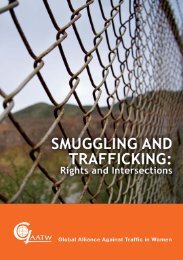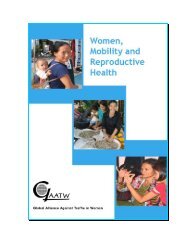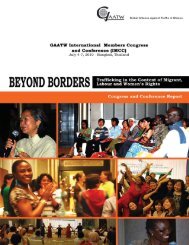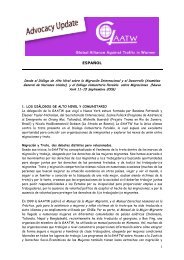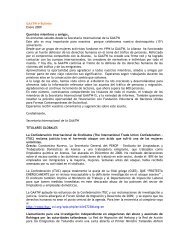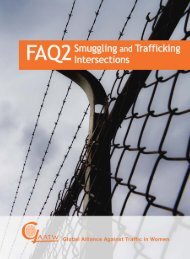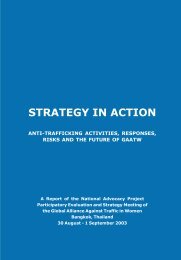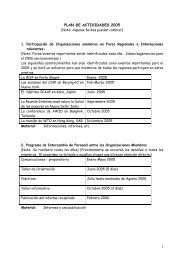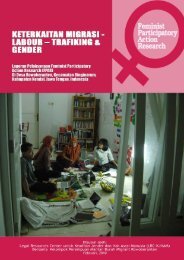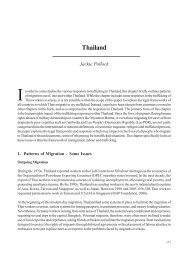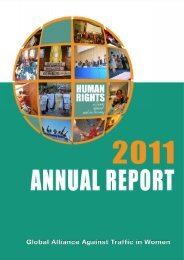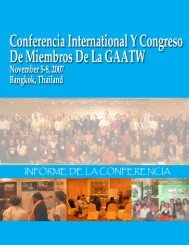Exploring Links between Trafficking and Migration - Global Alliance ...
Exploring Links between Trafficking and Migration - Global Alliance ...
Exploring Links between Trafficking and Migration - Global Alliance ...
- No tags were found...
Create successful ePaper yourself
Turn your PDF publications into a flip-book with our unique Google optimized e-Paper software.
<strong>Exploring</strong> <strong>Links</strong> <strong>between</strong> <strong>Trafficking</strong> <strong>and</strong> <strong>Migration</strong>Bad Immigration <strong>and</strong> Good Anti-trafficking Measures Pass Together in Spain 57This example is of recent legislation that tells us we need to pay attention to bothmigration <strong>and</strong> anti-trafficking measures at the same time.In late October 2009 Spain reformed its immigration law. On the one h<strong>and</strong>, this wasa success for anti-trafficking advocates. Article 59 of the law changed to givetrafficked persons a reflection period of at least 30 days so that they have sometime to decide whether they want to cooperate with authorities. During the reflectionperiod, they will receive assistance <strong>and</strong> have the right to work. Deportation orrepatriation processes that may have been underway will be stopped.On the other h<strong>and</strong>, while this was reformed, migrants’ rights were limited. Peoplecan now be held in detention centres for undocumented migrants for 60 days (upfrom 40). Family reunification rights were also limited. While we may be rejoicingthe “win” for trafficked persons’ rights, the scaling down of migrants’ rights hasthe potential to not only affect all migrants, but also trafficked persons who mightnot have been identified as such <strong>and</strong> are in detention or who are trying to bringfamily to Spain because they feel they cannot go back to their home countries.<strong>Migration</strong> Laws Trump Anti-<strong>Trafficking</strong>: We Need to Engage with BothFrameworks 58In 2008 Bonded Labour in the Netherl<strong>and</strong>s (BLinN), an NGO, assisted a Chinesewoman who was pregnant in a migration detention centre. Though she was trafficked,she had been processed as an “illegal” due to be deported.The woman was brought to the Netherl<strong>and</strong>s in 2002. She entered the country withfalse documents (probably provided by the trafficker/smuggler) <strong>and</strong> was stopped atthe airport. She applied for asylum <strong>and</strong> was placed in an asylum seekers’ centre,which she left. While living undocumented, she met a man who said he would helpher (it is not clear if this man had ties to the persons who had smuggled/traffickedher into the country). After staying with him for a week, he sold her to two othermen. These men forced her to provide sexual services. After several months shewas pregnant <strong>and</strong> managed to get away.She went to the police to press charges against the men. The police saw in theirregistration system that she had an unserved sentence of 60 days (convicted forentering the country with false documents), <strong>and</strong> they placed her in (penal) detention.She was assured by the police that they would visit her during her detention to takeher statement against the traffickers. However, this did not happen, <strong>and</strong> theauthorities had plans to keep her in immigration detention after she had finishedher sentence.BLinN met her in detention, <strong>and</strong> through their intervention, she was able to presscharges. The police claimed that they had told her to contact them after her (penal)detention, <strong>and</strong> that they had not promised to visit her. However, the woman did notknow their names or telephone numbers, nor did she speak English or Dutch, so itwould seem the police were covering up for their mistake.The woman was denied the possibility of pressing charges against her trafficker.Her conviction of entering the Netherl<strong>and</strong>s with false documents tookprecedence (even though this crime was possibly connected to her beingtrafficked/smuggled). Dutch bureaucracy is such that she got “lost” in the system;once forgotten by the police, she was processed as just another “illegal” to bedeported.The woman pressed charges against her traffickers <strong>and</strong> was released (with B9protection).21



